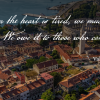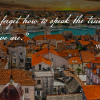
Published: June 30, 2000
View the Original Newsletter: Iskra-61.pdf
About This Issue
Iskra No. 61 presents a vivid snapshot of both frustration and hope within the Croatian diaspora. Editor Valentina Krčmar blends deeply personal reflections with sharp social critique, especially in her Motrišta column, which exposes the difficulties Croatians face with Canadian immigration processes.
At the same time, the issue celebrates the perseverance of Croatian culture abroad — from charity drives to church festivals — proving that even in moments of disillusionment, the Croatian spirit remains unbroken.
Editorial: “To Our Readers”
Valentina opens with gratitude toward Iskra’s supporters and contributors, including a heartfelt thank-you to the Filiplić family for their generous donation. She stresses that community support keeps Iskra alive and encourages readers to continue sending in stories and photographs from Croatian events across Ontario.
She also bids farewell to Father Josip Gjuran, a long-time spiritual leader in the Toronto Croatian community, who is returning home to Croatia. His service and compassion, she notes, have left a deep mark on parish life.
“Let us share our stories — when we share joy, we all become richer.”
Iskra-61
Motrišta: “How We Fell Asleep”
Valentina’s Motrišta column is the centerpiece of this issue — a passionate and, at times, angry reflection on the bureaucratic obstacles Croatians face when bringing family members to Canada.
She recounts the ordeal of a woman trying to sponsor her 89-year-old mother to join her in Canada. The costs — more than $1,400 CAD plus travel expenses — and the demeaning process at the Canadian Embassy in Vienna leave her outraged.
“Why must a grandmother in her eighties be treated as a threat?”
Even worse, she reveals that Croatian men aged 21–65 are forced to answer invasive questions about their wartime service — such as military ID numbers, commanders’ names, and deployment locations — on forms allegedly designed to screen for war criminals.
Valentina challenges the World Croatian Congress in Canada to act:
“Where are you? Is your task to organize concerts, or to protect the dignity of Croatian people?”
Her essay is both investigative and emotional, concluding with a call for unity and accountability.
“We who were attacked still live as if we must defend ourselves — even now, in peacetime, even in Canada.”
Iskra-61
National and Political News
Iskra continues its coverage of major developments in Croatia and the Balkans:
-
Siniša Glavašević, the famed Vukovar radio journalist, was reportedly murdered by a Serbian paramilitary nicknamed Bulidža, according to new testimony published in Globus.
-
The “fake war-invalid” scandal continues to unfold, with calls for reform within Croatia’s Ministry of Veterans’ Affairs.
-
Tourism hits a record high in visitor numbers, signaling cautious optimism for the Croatian economy.
-
The Montenegrin president’s apology to Dubrovnik residents is met with mixed reactions.
-
Reports from Osijek’s “New Century” summit highlight post-UNTAES reconstruction efforts and hopes for long-term recovery.
Community in Focus
A Call to Help Zagreb’s “Sisters of Mercy” Hospital
Father Gjuran issues an appeal for donations to purchase a urological diagnostic machine worth $45,000 USD for the Sestre Milosrdnice Hospital in Zagreb. Funds are being collected through the Croatian Credit Union in Toronto, with the priest himself contributing $200 and pledging more.
“Let us help those who help the sick.”
Iskra-61
Biciklijada & Hodijada 2000
The 9th annual bike-and-walk fundraiser at Father Kamber Park in Mississauga draws hundreds despite rainy weather. Croatian consul Ivan Picukarić opens the event, praising its humanitarian and community spirit.
Father Gjuran’s final sermon at the event intertwines the Feast of Corpus Christi (Tijelovo) with messages of unity and gratitude:
“Where there is God, there is peace. Where Jesus enters, fear disappears.”
Iskra-61
Faith and Reflection
Father Gjuran’s farewell mass resonates throughout the community. His emotional words — “You will never know how much you mean to me” — bring many to tears. He promises to return for Easter next year, though he admits this may be his final visit.
Valentina captures the collective sentiment: gratitude, sadness, and admiration for a priest who served the diaspora for three decades.
Culture and Post Festum
Valentina writes a candid piece criticizing the lack of attendance by Croatian intellectuals at cultural events — specifically, the Toronto concerts by the Ivan Goran Kovačić Male Vocal Ensemble.
“Where were our intellectuals? Those who ask for something ‘better’ didn’t come even when it arrived.”
She questions whether the community truly values culture or has become too complacent, ending with a challenge:
“Who really loses — the people or the intellectuals?”
Iskra-61
Letters to the Editor
The issue includes a letter from Hilda M. Foley, expressing outrage over EU funding allocations that appear to reward Serbia more than Croatia, as well as a note of gratitude from a reader thanking chiropractor Dr. Michele Žigrović for offering free care to newcomers in Mississauga.
Both letters highlight the compassion and activism still alive in the Croatian-Canadian community.
Health Column: “Piercings — Fashion or Danger?”
Dr. Darko Desaty warns of the growing trend of body piercings and their potential health risks, including infection, scarring, and allergic reactions.
“Before piercing, think twice — beauty fades, but scars remain.”
Iskra-61
Closing Reflection
The June 2000 issue of Iskra is one of Valentina Krčmar’s most impassioned. It confronts injustice, celebrates community, and reminds readers that vigilance and compassion are not mutually exclusive.
“We are still fighting for dignity — not on the battlefield, but in offices, embassies, and everyday life.”




